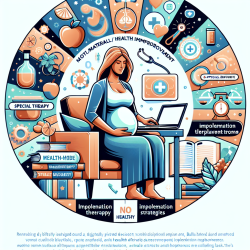Introduction
As practitioners in the field of speech-language pathology, we often focus on the developmental and communicative aspects of our clients, particularly children. However, the broader educational environment, including college policies on alcohol and gambling, can significantly impact the developmental trajectory of young adults. A recent study titled "The Epidemiology of College Alcohol and Gambling Policies" provides insights that can be leveraged to improve outcomes for students, particularly in the context of addiction and recovery. This blog explores how practitioners can use the findings from this research to enhance their practice and encourage further inquiry.
Understanding the Research
The study conducted by Shaffer et al. (2005) offers a comprehensive assessment of college alcohol and gambling policies across the United States. It highlights a critical gap: while all colleges have some form of alcohol policy, only a minority have policies addressing gambling. Furthermore, punitive measures dominate, with recovery-oriented policies being less prevalent. This imbalance suggests a missed opportunity to support students in recovery and prevent addictive behaviors.
Key Findings and Implications
The research identified that:
- Most colleges lack comprehensive gambling policies, which could inform students about the risks associated with gambling.
- Punitive alcohol policies are more common than recovery-oriented ones, potentially overlooking the benefits of rehabilitative measures.
- Schools with prohibitive alcohol policies tend to have lower binge drinking rates, yet the presence of recovery policies does not necessarily correlate with lower drinking rates, possibly due to pre-existing issues.
These findings underscore the need for a balanced approach that incorporates both prevention and recovery strategies. For practitioners, this means advocating for policies that support holistic student well-being, including mental health and recovery services.
Actionable Steps for Practitioners
Practitioners can play a pivotal role in shaping educational policies and supporting students by:
- Collaborating with educational institutions to develop comprehensive policies that address both alcohol and gambling issues.
- Advocating for recovery-oriented programs that provide support for students struggling with addiction.
- Encouraging research into the effectiveness of different policy approaches, thereby contributing to evidence-based practices.
By engaging with educational stakeholders, practitioners can help create environments that foster healthy behaviors and support students' developmental needs.
Encouraging Further Research
The study by Shaffer et al. opens the door for further research into the impact of college policies on student behavior. Practitioners are encouraged to explore questions such as:
- How do different policy approaches affect student outcomes in terms of addiction and recovery?
- What role do cultural and institutional factors play in shaping the effectiveness of these policies?
- How can data-driven insights be used to refine and improve policy implementation?
By pursuing these lines of inquiry, practitioners can contribute to a deeper understanding of how educational policies influence student well-being.
Conclusion
The insights from "The Epidemiology of College Alcohol and Gambling Policies" provide a valuable framework for practitioners seeking to improve student outcomes. By advocating for balanced policies and engaging in further research, practitioners can help create supportive educational environments that promote healthy development. To read the original research paper, please follow this link: The epidemiology of college alcohol and gambling policies.










